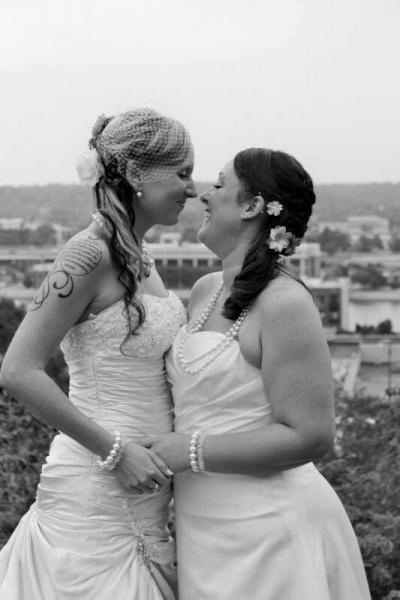Reaction Time: The Pros And Cons Of A Marriage-Centric Gay Rights Movement

Adorned with their equality logo, these emails typically include updates on the work of anti-LGBT activists as well as what HRC is doing in response to those actions, a status report for people who donate any amount of money per month to the campaign. For the past two years, the majority of HRC’s emails – and their work, and likely their funds – have been devoted to spreading marriage equality throughout the United States. For the past two weeks, however, HRC's emails have been vastly different.
For the past two weeks, I have received emails that speak less about marriage equality and more about the many other issues affecting the gay community. In one email, Griffin writes: “Forget marriage, we have an even bigger mountain to climb… every LGBT American has the right to live free of discrimination, marriage equality is just one piece of the puzzle.”
READ MORE: Stop Talking About Marriage Eqality
While Griffin’s words may seem flippant, I believe that they mark an incredibly important transition that everyone else working toward equality for LGBT people should follow: the transition away from focusing on marriage equality and towards focusing on other, arguably more important issues.
First, let's not forget that marriage equality is important to the “gay rights movement” for several reasons. On the practical level, marriage equality is important because it allows loving, committed gay and lesbian couples to enjoy the same tax benefits and hospital visitation rights (among other protections) as their heterosexual friends and family members. On a deeper level though, marriage equality is important for its public relations appeal, attracting media attention and straight allies.
Everybody loves a wedding, and while the weddings found in the “happy endings” of TV and film are almost always heterosexual, the perception of weddings as incredibly romantic, blissful occasions has been nothing but helpful to the marriage equality movement and, by extension, the gay rights movement in general. Weddings are aesthetically pleasing displays of beautiful people reveling in their love for each other; they are not controversial in nature, nor are they foreign – most people have been to at least one if not more than one wedding in their lifetimes. Using the sounds and sights of a familiar, bright, happy wedding to appeal to the media and to straight allies who, in the past, may have considered gay relationships to be even incomprehensible normalizes those relationships and has likely played a role in increasing public approval not only for marriage equality, but for gay relationships in general.
According to several different Gallup polls, as approval for marriage equality has increased throughout the past seven years, so has “moral approval” for gay and lesbian relationships as well as approval for adoptions by gay parents. Although these polls may simply be reflective of an overall change in American opinion on gay rights, it’s likely that the incredibly fast-moving, romanticized public relations campaign focused on gay marriage has contributed to this surge in public approval.
So, the campaign for marriage equality has been incredibly useful for the gay rights movement. But, taking into consideration both the current makeup of the Supreme Court as well as the sociopolitical climate of the United States on this issue, I would say it is likely that the marriage equality movement will achieve its ultimate goal of striking down gay marriage bans throughout the nation within the next six months. If this occurs, it will be a huge victory for the gay rights movement – but, it absolutely cannot mark the end of the work that organizations like HRC do.
READ MORE: What The Hell Is Going On With Gay Marriage?
The undeniable truth is that marriage does not guarantee freedom from homophobia, violence or other forms of discrimination. We can live without marrying the person that we love. But, there are other very real issues facing the gay community that threaten people's lives, livelihoods, psychological security and well-being. According to the Anti-Defamation League, as of September 2014, 18 U.S. states had no enhanced sentences in place for perpetrators of hate crimes based on sexual orientation, and 39 states had no enhanced sentences in place for perpetrators of hate crimes based on gender identity. Furthermore, conversion therapy (which recently made the news with the suicide of transgender teenager Leelah Alcorn) is currently legal for minors and adults in every state except California, New Jersey and Washington D.C., despite the fact that, according to the Southern Poverty Law Center, it can cause “increased anxiety, depression, and in some cases, suicidal ideation”. In addition, only 21 states explicitly prohibit discrimination in the workplace based on sexual orientation, and only 18 states prohibit workplace discrimination based on gender identity.
Centering the gay rights movement on marriage equality made sense for a time to garner support, but with marriage equality on the horizon, it’s incredibly important that other, more important issues do not fall by the wayside. While a marriage equality victory would be a huge step forward for the gay rights movement, it is important that those fighting for equality do not relax and celebrate in the wake of such a victory. Marriage is not the end goal: it is one of many steps toward equality that members of the gay rights movement must continue to fight for. In the wake of a marriage equality victory, those that continue to hate - the bigots, the zealots – they will not rest. And, neither should we.
There is much more work to be done.
Get more "Reaction Time", common sense reactions to everyday craziness.



